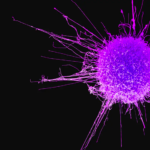Author : Dr. Chaitra Prakash, Consultant Dermatologist, HCG Cancer Hospital Bengaluru
India
healtysoch
New Delhi, November 23, 2021 :
Medical advances today have gifted new effective treatment pathways to fight cancer. While these therapies are life-saving, they sometime come with a cost. These are generally referred to as side-effects or adverse reactions.
Studies suggest, two out of three people on cancer therapy experience noticeable and negative effects on skin, scalp and nail, which in turn, can truly take a toll on one’s quality of life. Most of these skin-related conditions are minor and may resolve on their own, while on the other hand, some rarely can be progressively symptomatic, permanently lasting, or potentially life-threatening. They can hinder the cancer treatment progress and sometimes can lead to stoppage of treatment as well. People on cancer therapy are also at an increased risk of developing skin infections and allergies owing to altered immunity and chronic debility.
Nearly all cancer treatments, including chemotherapy, immunotherapy, radiation therapy and bone marrow transplantation have the potential to cause skin reactions which can vary depending on the type and length of treatment. Individual patients may react differently to treatments.
Oncodermatology is an evolving field of medicine, focused on providing timely and efficient access to skin care for people with cancer during and after therapy. This relatively unfamiliar subspeciality aims to address the many different skin related concerns and the care that is needed to improve the quality of life in those diagnosed with cancer while also helping them to continue with their life-saving treatments.
Common skin symptoms during cancer treatment
- Excessive skin dryness, itching and rashes
- Burning and skin peeling
- Fragile nails and painful fingertips
- Swelling and blisters in hands and feet
- Sore mouth
- Intolerance to sunlight
- Hair loss
- Skin discoloration and hardening
What to expect when you experience a skin symptom?
Before you begin treatment, talk to your doctor about the possible side effects of your treatment and inform previous allergy to medicines, if any. You may wish to consult a dermatologist if you have a pre-existing skin condition to take advice on appropriate care during cancer therapy to prevent worsening.
Lower grade skin adverse effects can be managed at home with the help of your treating doctor’s advice and supportive medications. For more advanced and severe episodes, although uncommon, one may require hospitalization, detailed workup, temporary interruption in cancer therapy and occasionally, intensive care.
Ways to cope with skin changes during cancer treatment
Skin changes can be a part of cancer therapy. Practicing good skin care can reduce discomfort and improve treatment outcome. Caring for your skin by moisturising regularly is beneficial, especially in elderly and people with history of dry skin conditions like eczema or psoriasis.
Skin must be protected from harmful ultraviolet rays of the sun as it may increase one’s risk for light sensitivity as well as skin cancers. Experts recommend wearing protective clothing and use of broad-spectrum sunscreen lotions during the day. While on treatment, regularly self-examine for new skin changes that may occur and let your doctor know about your symptoms at the first notice and get advice on how to manage.
healthysoch







